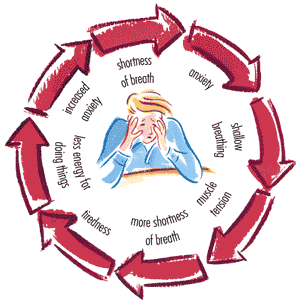Anxiety Information
Click here to scroll to the list of available medications ↓
Anxiety is both an emotional feeling and a disorder. Anxiety is a normal feeling and can be brought about by changes, uncertain situations, the knowledge that something is about to change, or an experience of uncertainty. However, when anxiety interferes with a person’s ability to function in everyday situations or to participate in the daily activities of life, anxiety is then considered a disorder.
Anxiety disorders may bring on symptoms such as restlessness, fatigue, a chronic feeling of being edgy, a lump in the throat, difficulty concentrating, being easily distracted, irritability, insomnia, impatience, excessive sweating, shortness of breath, stomach aches, diarrhea, headaches, muscle tension, and anxiety attacks, which can feel very much like heart attacks. Anxiety disorders may be constant or may come in periods of dysfunction. In some people anxiety is always there but at varying degrees. Chronic anxiety disorders do not typically improve without professional intervention.
Though doctors and researcher have tried to understand why some people have stronger anxiety emotions than others, they haven’t been able to determine the cause of anxiety disorders. When anxiety arises in an otherwise emotionally healthy person, this causes hormones to be released that indicate to the body it may need to flee or fight. This is known as the flight or fight response. It is a primitive yet intricate part of the human make up. The anxiety is response is normal when threatened or when the perception of being threatened arises, however, chronic anxiety is not.

Possible causes of anxiety disorders include chronic illnesses, specific illnesses such as hyperactive thyroid, severe stress or chronic stress, a reaction to trauma, heredity factors, and personality traits. Post traumatic stress disorder can often mimic anxiety disorders and it can be very difficult to tell the two apart in some cases.
Risk factors for a chronic anxiety disorder are somewhat vague, although they may include a stressful lifestyle, a familial anxiety disorder, poor nutrition, a long term build up of stress, a personality disorder that is more likely to lead to anxiety disorders, and a serious or long term illness or injury. Chronic anxiety disorders tend to happen much more frequently in people with chronic diseases such as high blood pressure, diabetes, lupus, and osteoarthritis.
Diagnosing chronic anxiety usually entails an office visit with either a physician or a mental health professional. A psychological evaluation can help determine whether a patient is suffering from chronic anxiety or a lesser degree of anxiety. A physical examination is recommended to rule out any physical causes for intense anxiety. Most physicians and mental health professionals will not diagnose a chronic anxiety disorder unless the patient presents with life affecting symptoms for at least six months or more. Short term chronic anxiety is not the same as chronic anxiety disorder. Short term anxiety is usually diagnosed through an evaluation, and often the patient can determine the cause of their anxiety.
Treatment for anxiety is determined by the severity of the anxiety, and whether it is considered chronic or short term. Medications such as antidepressants or anti-anxiety medication may be prescribed to help the patient relax in order to deal with the cause of the anxiety. In short term anxiety, anti-anxiety medications usually work well enough. In chronic anxiety, antidepressants may be used along with anti-anxiety medications. Medication is not always the first choice when dealing with anxiety. It may seem like the easiest, but unless the cause of the anxiety is determined, the patient will never recover and live with only a normal or moderate amount of anxiety. Psychotherapy or talking therapy is a more direct method of dealing with the anxiety, whether it is long term or short term. Psychotherapy can often help alleviate the anxiety through discovering the root of the problem or by teaching the patient new coping skills.
People who suffer from anxiety are more likely to develop other health problems. Anxiety sufferers tend to be less healthy overall, even catch more colds than those with average levels of anxiety. Those with anxiety disorders may not be able to function normally, enjoy a day at the beach or even take their dog for a walk. Daily activities can cause too much anxiety for serious cases.
Dealing with anxiety is difficult, and the patient needs to learn to take one day at a time in order to develop better coping skills slowly. Celebrating the small achievements is likely to lead to larger ones.